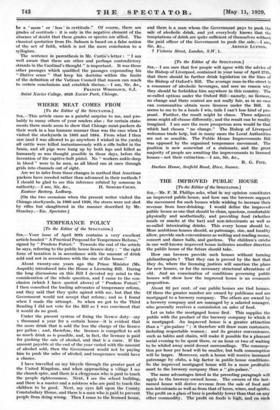TEMPERANCE POLICY
[To the Editor of the SPECTATOR.]
SIR,—Your issue of April 20th contains a very- excellent article headed " A Practical Proposal for Temperance Reform," signed by " Pruden Futuri." Towards the end of the article he says, referring to the public house licence duty : " the right form of taxation is in accordance with the amount of drink sold and not in accordance with the size of the house."
About twenty-one years ago the Prime Minister (Mr. Asquith) introduced into the House a Licensing Bill. During the long discussions on this. Bill I devoted my mind to the consideration of the whole question, and I came to the con- clusion (which I have quoted above) of " Pruden Futuri." I then consulted the leading advocates of temperance reform, and they said that they quite agreed with me, but that the Government would not accept that reform ; and so I found when I made the attempt. So when we got to the Third Reading I did not vote for the Bill as I was convinced that it would do no good.
Under the present system of fixing the licence duty—say s thousand a year for a certain house—it is evident that the more drink that is sold the less the charge of the licence per gallon ; and, therefore, the licensee is compelled to sell as much drink as is possible, and, in fact, the licensee is paid for .pushing the sale of alcohol, and that is a curse. If the amount payable at the end of the year varied with the amount of alcohol sold, then the Government would not be paying him to push the sales of alcohol, and temperance would have a chance.
I have travelled on my bicycle through the greater part of the United Kingdom, and when approaching a village I see the church spire, and there is a clergyman who is paid to teach the people righteousness. Next, I see the school building, and there is a master and a mistress who are paid to teach the children to be good. Next, my eyes fall upon the County Constabulary House, and there is a man who is paid to prevent people from doing wrong. Then I come to the licensed house, and there is a man whom the government pays to push the sale of alcoholic drink, and yet everybody knows that the temptations of drink are quite sufficient of themselves without the paid officer of the Government to push the sale.—I am, Sir, &c., ARNOLD Lurrow. 7 Victoria Street, London, S.W .1.










































 Previous page
Previous page